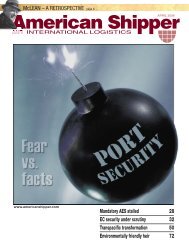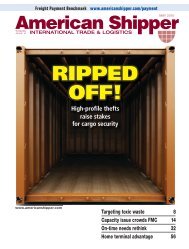Pirate Busters - American Shipper
Pirate Busters - American Shipper
Pirate Busters - American Shipper
You also want an ePaper? Increase the reach of your titles
YUMPU automatically turns print PDFs into web optimized ePapers that Google loves.
TRANSPORT / OCEAN<br />
• Travel at low speed.<br />
• Have low freeboard (distance<br />
from waterline to main<br />
open deck).<br />
• Have inadequate response<br />
planning and procedures in place.<br />
• Do not maintain a high state<br />
of alert or signal that they have<br />
self-protective capabilities.<br />
• Are slow to respond to an<br />
attack.<br />
Most attempted ship raids have<br />
been repulsed by crews, who have<br />
planned, trained and employed<br />
passive counter measures such<br />
as zig-zag maneuvers, fire hoses, night<br />
vision optics, transiting at night and even<br />
dummies posted at the rails to simulate<br />
additional lookouts.<br />
Some vessel operators have employed<br />
unarmed — and in a few instances, armed<br />
— security forces to help set up defensive<br />
tactics and repulse attacks while transiting<br />
the region. Most operators are reluctant<br />
to use armed security because of liability<br />
concerns if a guard injures or kills someone,<br />
a maze of differing firearms restrictions<br />
among international ports, and a potential<br />
for more violent pirate responses.<br />
The U.S. government should press other<br />
flag-nations to ensure that ocean carriers<br />
comply with the International Ship and Port<br />
Facility Security Code and adopt best security<br />
practices, according to a recent report<br />
on piracy from the Heritage Foundation.<br />
In May, the U.S. Coast Guard issued a<br />
security directive requiring U.S.-flagged<br />
vessels to conduct risk assessments of their<br />
vessels, develop anti-piracy plans, and<br />
establish communications with military<br />
forces in the area. The sea service recommended<br />
the use of several non-lethal<br />
precautions and that the industry should<br />
consider supplementing crews with armed<br />
or unarmed security personnel.<br />
Many ocean carriers are betting on<br />
the low odds of pirate attack rather than<br />
spending heavily on security measures<br />
because the shipping industry, which has<br />
modest margins even in the best of times,<br />
is being ravaged by the global recession<br />
and low rates.<br />
Nonetheless, for carriers operating<br />
around the Gulf of Aden costs have risen<br />
through higher insurance premiums, higher<br />
fuel costs and fewer revenue-making trips<br />
for the limited number of tankers and other<br />
high-risk vessels sent around Africa rather<br />
than through the Suez Canal short cut, and<br />
ransoms in the $1 million to $2 million<br />
range for captured ships.<br />
One tactic companies have neglected<br />
so far is to hire private security vessels to<br />
serve as a “picket” for commercial shipping.<br />
32 AMERICAN SHIPPER: OCTOBER 2009<br />
Many ocean carriers are betting<br />
on the low odds of pirate attack rather<br />
than spending heavily on security<br />
measures because the shipping industry,<br />
which has modest margins even<br />
in the best of times is being ravaged<br />
by the global recession and low rates.<br />
Private escorts could interdict pirate<br />
ships, chase them away from commercial<br />
vessels and then prevent the attack skiffs<br />
from rejoining their mother ship by using<br />
non-lethal means to incapacitate or deter<br />
the pirate craft, the Heritage Foundation<br />
report said, without any reference to the<br />
potential cost of such an option compared<br />
to onboard security.<br />
Private security firms Glenn Defence<br />
Marine Asia and Background Asia Risk<br />
Solutions, in particular, provided vessel<br />
escorts during the height of the piracy<br />
scourge in the busy Straits of Malacca,<br />
according to Patrick Cullen, an expert on<br />
private military companies. Piracy has<br />
markedly declined there since 2005 after<br />
the littoral states — Indonesia, Malaysia<br />
and Singapore — made a concerted effort<br />
with help from the international community<br />
to beef up ocean and air security patrols.<br />
Blackwater USA, the notorious private<br />
security firm that recently changed its<br />
name to Xe Services LLC, saw a business<br />
opportunity to protect cargo vessels in the<br />
Gulf of Aden and two years ago invested<br />
in a security ship and crew. It bought and<br />
refurbished a 40-year-old National Oceanic<br />
and Atmospheric Administration vessel<br />
outfitted with inflatable speed boats with<br />
rigged hulls, hand-launched unmanned<br />
aerial vehicles and a landing pad capable<br />
of handling a couple of small<br />
helicopters for surveillance and<br />
forward defense.<br />
The venture was shut down because<br />
of lack of interest from ship<br />
owners, partly due to costs; ship<br />
owners’ reluctance to do business<br />
with a security contractor whose<br />
armed guards were accused of<br />
using excessive force in several<br />
deadly incidents in Iraq; and the<br />
fact that its ship, the McArthur,<br />
was too slow and couldn’t keep<br />
up with the vessels it needed to<br />
escort, according to insurance<br />
and private security industry experts.<br />
French security firm Secopex also provides<br />
armed onboard security teams and<br />
vessel escorts, according to its Web site.<br />
Escorting ships is a traditional state navy<br />
responsibility. International forces have<br />
set up patrolled transit lanes in the Gulf<br />
of Aden and offered a limited number of<br />
scheduled escorts through the waterway.<br />
The lack of demand for security boats<br />
to shadow cargo ships is a function of the<br />
available naval presence and the relatively<br />
small number of attacks, said Claude Berube,<br />
an instructor in the political science division<br />
at the U.S. Naval Academy, in an interview.<br />
Private escort ships can provide armed<br />
security hundreds or thousands of meters<br />
from the vessel, eliminating having armed<br />
riders onboard, which ship operators believe<br />
could escalate violence and threaten<br />
their ships, crews and insurance rates.<br />
But the escort ships are not a viable option<br />
unless pirate attacks substantially increase<br />
or naval force protection decreases, Berube<br />
said. At that point, shipping companies<br />
would have to undertake a cost-benefit<br />
analysis to see whether a guard ship was<br />
worthwhile.<br />
“I don’t think the level of piracy has<br />
reached the level where private escort ships<br />
would be affordable to private shipping<br />
companies. So there’s the theoretical aspect<br />
The U.S. government significantly increased its focus on Somali pirate<br />
attacks after the U.S.-flag Maersk Alabama was hijacked and required a<br />
military rescue of its captain last spring.










